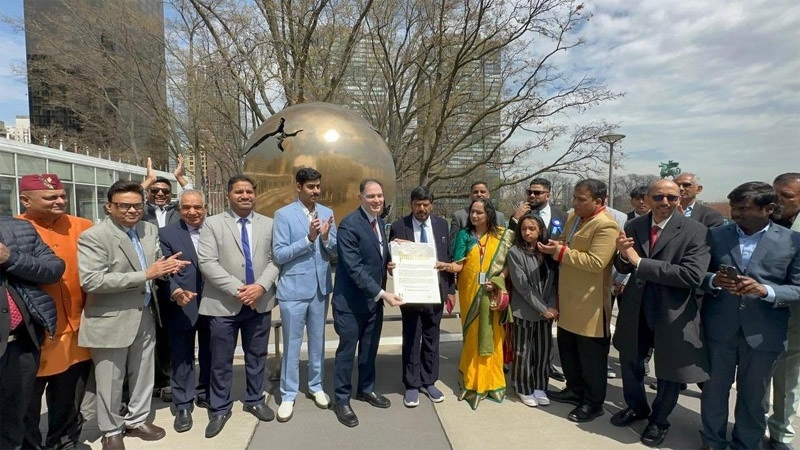New York City declares April 14 as Dr B R Ambedkar Day
| Date :16-Apr-2025 |

NEW YORK
NEW YORK City Mayor Eric Adams has proclaimed April 14, 2025 as Dr B R Ambedkar Day in New York City, with its 8.5 million residents celebrating the day, a top official in the Mayor’s office said here.
Deputy Commissioner for the New York City Mayor’s Office for International Affairs Dilip Chauhan made the announcement here in the presence of Minister of State for Social Justice and Empowerment Dr Ramdas Athawale, who delivered the keynote address at a special event organised at the UN headquarters on Monday to commemorate Dr Ambedkar’s 134th birth anniversary.
“A historic moment at the UN Headquarters in New York as Dr Babasaheb Ambedkar’s birth anniversary is officially proclaimed by the NYC Mayor’s Office. My heartfelt thanks to Mayor @NYCMayor and Deputy Commissioner Dilip Chauhan for honouring Babasaheb’s global legacy of justice and equality,” Athawale posted on X along with photos and a video.
Born on April 14, 1891, Dr Bhimrao Ambedkar – popular among his followers as Babasaheb – was the Chairman of the Constituent Assembly’s most crucial Drafting Committee that earned him the moniker Architect of the Indian Constitution.
He was also the Minister of Law and Justice in PM Jawaharlal Nehru’s first Cabinet post-Independence.
Ambedkar, who played a key role in social movements that fought for the rights of Dalits and untouchables, had received his PhD in Economics from Columbia University in 1927 and an honourary degree in 1952.
Chauhan said Dr Ambedkar’s ideals go beyond borders and time, finding strong connections in the halls of the United Nations and New York—a city built by immigrants, energised by its diversity and united by its shared belief in opportunity and inclusion. Foundation for Human Horizon President Deelip Mhaske said it is a profound recognition of one of the world’s most transformative champions of equality and civil rights that April 14 has been proclaimed as ‘Dr Bhimrao Ramji Ambedkar Day’.
The proclamation acknowledges Dr Ambedkar’s towering legacy in advancing democracy, dignity, women’s empowerment and justice for historically marginalised communities, Mhaske said. Mhaske expressed gratitude to Adams noting that “this proclamation is more than symbolic—it is a moral declaration that positions New York as a global capital for human rights and justice.”
India’s Permanent Representative P Harish said that Dr Ambedkar looked at democracy as a way of life and whose institutional mechanisms and pillars were not an end in themselves, but the means to bring into play the constitutional morality Constitution to ensure that all citizens enjoyed equality and were able to fully utilise their capacities.
, resulting in a nation with citizens and communities demonstrating shared interests and mutual respect and informed by fraternity.
“Indeed, at a global level, this is a same vision that animates a multilateral system represented by the United Nations - how to ensure that the framework of morality of the UN Charter guides the international order and interaction between peoples and nations so that we have justice and equality with no nation left behind,” Harish said.
Dr Ambedkar’s advocacy resonates far beyond borders of India: Athawale
By Yoshita Singh
UNITED NATIONS,
THE principles that Dr B R Ambedkar fought for—equity, representation and human rights—are more relevant than ever in the international community’s collective efforts to achieve the 2030 Sustainable Development Goals, Minister of State for Social Justice and Empowerment Dr Ramdas Athawale told an audience at the United Nations.
“Dr Ambedkar’s life is not merely a chapter in Indian history—it is a beacon for all humanity. Born into adversity, he transcended every barrier imposed by caste, poverty and colonial oppression to become a global advocate for equality,
dignity and democracy.
His advocacy resonates far beyond the borders of India, making him an icon for the modern human rights movement,” Athawale said. Athawale delivered the keynote address at a special event organised at the UN headquarters Monday by the Permanent Mission of India to the UN to commemorate Dr Ambedkar’s 134th birth anniversary.
Athawale added that as “we gather here under the banner of the United Nations, we recognise that the principles Dr Ambedkar fought for—equity, representation, and human rights—are more relevant than ever in our collective effort to achieve the 2030 Sustainable Development Goals.”
The event ‘Timeless appeal of Ambedkar’s vision within the United Nations and beyond’ was attended by UN envoys, officials, members of the Indian diaspora and civil society.
Underlining that Dr Ambedkar’s life continues to inspire transformation at every level of society, Athawale noted that as custodians of his legacy, the Ministry of Social Justice and Empowerment has taken decisive and systemic steps to translate the iconic Indian leader’s ideals into transformative action. He told the audience that the Ministry oversees a wide spectrum of programmes and policies aimed at uplifting historically marginalised communities, especially Scheduled Castes, Other Backward Classes, senior citizens, transgender persons, and persons with disabilities.
Athawale highlighted some of the Ministry’s flagship initiatives including the National Overseas Scholarship scheme for Scheduled Castes, landless agricultural labourers that offers full financial support to pursue higher education in prestigious institutions abroad; the Pradhan Mantri Dakshta Aur Kushalta Sampann Hitgrahi (PM-DAKSH) Yojana that empowers youth from marginalised groups with demand-driven vocational training making them participants in India’s economic transformation; and the SMILE Scheme—Support for Marginalised Individuals for Livelihood and Enterprise—that caters to the socio-economic upliftment and rehabilitation of the transgender community and those engaged in the act of begging, ensuring dignity and opportunity through livelihood support and counselling.
Athawale underscored that each of these initiatives is not simply a programme, it is “pledge to bridge centuries of exclusion and to ensure that every citizen, regardless of birth, has access to justice, education, opportunity and dignity.”
